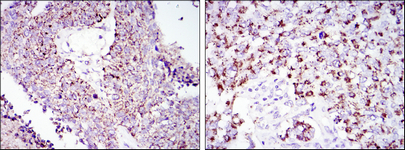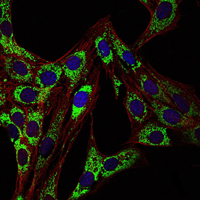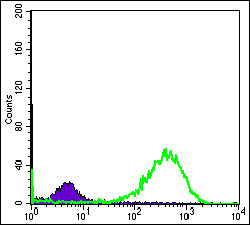HSP60 Monoclonal Antibody
- Catalog No.:YM0340
- Applications:WB;IHC;IF;FCM;ELISA
- Reactivity:Human;Mouse;Rat;Monkey
- Target:
- Hsp60
- Fields:
- >>RNA degradation;>>Type I diabetes mellitus;>>Legionellosis;>>Tuberculosis;>>Lipid and atherosclerosis
- Gene Name:
- HSPD1
- Protein Name:
- 60 kDa heat shock protein mitochondrial
- Human Gene Id:
- 3329
- Human Swiss Prot No:
- P10809
- Mouse Gene Id:
- 15510
- Mouse Swiss Prot No:
- P63038
- Rat Gene Id:
- 63868
- Rat Swiss Prot No:
- P63039
- Immunogen:
- Purified recombinant fragment of human HSP60 expressed in E. Coli.
- Specificity:
- HSP60 Monoclonal Antibody detects endogenous levels of HSP60 protein.
- Formulation:
- Liquid in PBS containing 50% glycerol, 0.5% BSA and 0.02% sodium azide.
- Source:
- Monoclonal, Mouse
- Dilution:
- WB 1:500 - 1:2000. IHC 1:200 - 1:1000. IF 1:200 - 1:1000. Flow cytometry: 1:200 - 1:400. ELISA: 1:10000. Not yet tested in other applications.
- Purification:
- Affinity purification
- Storage Stability:
- -15°C to -25°C/1 year(Do not lower than -25°C)
- Other Name:
- HSPD1;HSP60;60 kDa heat shock protein;mitochondrial;60 kDa chaperonin;Chaperonin 60;CPN60;Heat shock protein 60;HSP-60;Hsp60;HuCHA60;Mitochondrial matrix protein P1;P60 lymphocyte protein
- Molecular Weight(Da):
- 61kD
- References:
- 1. Clin Exp Rheumatol. 2008 Nov-Dec;26(6):1107-10.
2. APMIS. 2008 Oct;116(10):888-95.
- Background:
- This gene encodes a member of the chaperonin family. The encoded mitochondrial protein may function as a signaling molecule in the innate immune system. This protein is essential for the folding and assembly of newly imported proteins in the mitochondria. This gene is adjacent to a related family member and the region between the 2 genes functions as a bidirectional promoter. Several pseudogenes have been associated with this gene. Two transcript variants encoding the same protein have been identified for this gene. Mutations associated with this gene cause autosomal recessive spastic paraplegia 13. [provided by RefSeq, Jun 2010],
- Function:
- disease:Defects in HSPD1 are a cause of spastic paraplegia autosomal dominant type 13 (SPG13) [MIM:605280]. Spastic paraplegia is a degenerative spinal cord disorder characterized by a slow, gradual, progressive weakness and spasticity of the lower limbs.,disease:Defects in HSPD1 are the cause of leukodystrophy hypomyelinating type 4 (HLD4) [MIM:612233]; also called mitochondrial HSP60 chaperonopathy or MitCHAP-60 disease. HLD4 is a severe autosomal recessive hypomyelinating leukodystrophy. Clinically characterized by infantile-onset rotary nystagmus, progressive spastic paraplegia, neurologic regression, motor impairment, profound mental retardation. Death usually occurrs within the first 2 decades of life.,function:Implicated in mitochondrial protein import and macromolecular assembly. May facilitate the correct folding of imported proteins. May also prevent misfolding and promote the
- Subcellular Location:
- Mitochondrion matrix.
- Expression:
- Adipocyte,Adrenal gland,B-cell lymphoma,Brain,Cajal-Retzius
- June 19-2018
- WESTERN IMMUNOBLOTTING PROTOCOL
- June 19-2018
- IMMUNOHISTOCHEMISTRY-PARAFFIN PROTOCOL
- June 19-2018
- IMMUNOFLUORESCENCE PROTOCOL
- September 08-2020
- FLOW-CYTOMEYRT-PROTOCOL
- May 20-2022
- Cell-Based ELISA│解您多样本WB检测之困扰
- July 13-2018
- CELL-BASED-ELISA-PROTOCOL-FOR-ACETYL-PROTEIN
- July 13-2018
- CELL-BASED-ELISA-PROTOCOL-FOR-PHOSPHO-PROTEIN
- July 13-2018
- Antibody-FAQs
- Products Images

- Western Blot analysis using HSP60 Monoclonal Antibody against T47D (1), HeLa (2), HepG2 (3), A549 (4), Jurkat (5), HEK293 (6), NIH/3T3 (7), PC-12 (8) and Cos7 (9) cell lysate.

- Immunohistochemistry analysis of paraffin-embedded lung cancer tissues (left) and kidney cancer tissues (right) with DAB staining using HSP60 Monoclonal Antibody.

- Immunofluorescence analysis of 3T3-L1 cells using HSP60 Monoclonal Antibody (green). Blue: DRAQ5 fluorescent DNA dye. Red: Actin filaments have been labeled with Alexa Fluor-555 phalloidin.

- Flow cytometric analysis of Hela cells using HSP60 Monoclonal Antibody (green) and negative control (purple).




